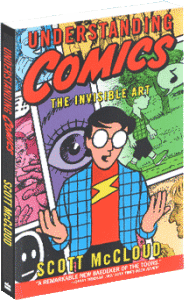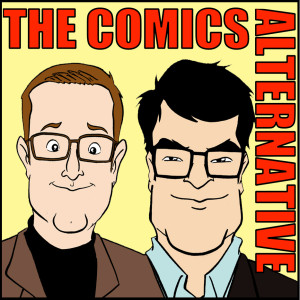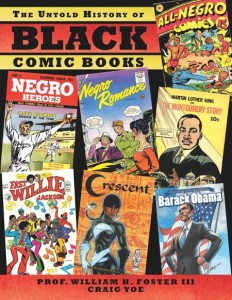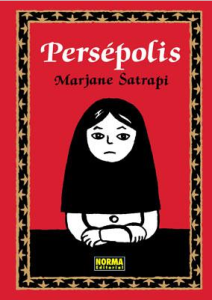Exploring Alternatives in Comics with Dr. Andrew Kunka

Not all comic book industry professionals are in the business of making comics. Some creators are creating the conversation around comics, and their wider impact to society today.
Dr. Andrew Kunka is an English professor at the University of South Carolina Sumter, but he is also one of the few professors in the world taking a closer lens to the literary importance of comic books.
Together with his colleague Derek Royal, Dr. Kunka also runs The Comics Alternative podcast, a weekly podcast and blog featuring indie, non-superhero, and as the name suggests, alternative comics.
Dr. Kunka gives us insight on how his childhood passion inspired his career and what some of the most prevalent themes are making waves in the industry today.
Laura Cerrone: How did you get into comic books?
Andrew Kunka: I’ve been reading comics at least since the age of four, so I don’t remember a time when comics weren’t a part of my life. As far as my earliest memory of comics is concerned: I remember my day care provider/babysitter had a stack of comics, mostly Harvey Comics, but some Archies, too. I was particularly into Richie Rich. But I grew up in the 1970s, and comics were ubiquitous: most grocery stores, drug stores, and newsstands sold comics. My parents, who grew up in the 1950s, thought that comics were just a normal part of kids’ lives. By the time I was six or seven, I started getting into Batman and Superboy and the Legion of Super-Heroes. The latter appealed to me because it had such a complex continuity and large cast of characters.
I also amassed a pretty large collection of comics early on when a neighbor, who was in his thirties, sold me his collection. I borrowed $25 from my parents to buy the collection, which consisted of thousands of Silver Age DC and Marvel comics. That was my education in superhero comics. Selling off pieces of that collection also helped me get through undergrad and grad school.
I’ve felt that comics kind of grew up with me, in that new, more sophisticated comics would come out just as I was ready for them. So, I was in my early teens when the independent comics movement started, with publishers like Pacific, Eclipse, and First Comics. By the time I was a senior in high school, The Dark Knight Returns, Watchmen, and Maus had come out. DC’s Vertigo line kept me going through college. So, unlike a lot of readers, I never had a period where I left comics and then came back later.
LC: Did your love of comic books direct your career or did the realization that you can still work with comic books come later?
AK: In grad school, I toyed with the idea of doing comics scholarship, but I focused on a more traditional concentration in 20th Century British Literature. My research focused in that area through the point at which I received tenure in my current position. Once I got tenure, something clicked, and I decided to switch my focus to Comics Studies. I never felt like I should wait until I got tenure to start studying comics, or that I wouldn’t get tenure if I were. It happened to be that I just started paying attention to the growing body of work in comics scholarship at that time, and I was excited by the opportunity to merge my hobby and my work.
I often feel like, if I could go back in time and tell my teenage self, “You know, you are going to have a job where you get to write about and teach comics every day,” he would give me a huge high-five.
From my discussions with other comics scholars, I’ve found that, because very few defined academic positions in Comics Studies exist, most of the people who do comics research seem to have a similar experience, getting a degree in a more traditional area of study and then moving into comics as their careers progressed. However, now more grad students are coming out of MA and PhD programs with actual graduate work in Comics Studies, so the field is changing.
LC: As a professor, how do you go about analyzing comics?
AK: I like to mix formal and cultural analysis. That is, students start out by examining how comics work as a medium. How do we read them? What makes comics a unique medium, separate from literature, film, and the visual arts? We usually use Scott McCloud’s Understanding Comics as the foundation for this analysis, giving students a vocabulary to use in their analysis. However, we also look at the strengths and weaknesses of McCloud’s terminology.
Then we usually move on to a new question: What types of stories is comics well-suited to tell? We go through various genres, like autobiography, history, superheroes, etc., to see how the formal qualities of comics lend themselves to those genres.
Finally, we look at some of the cultural aspects of comics, like how comics have depicted racial differences, how comics have followed or led in certain cultural changes, and why superhero narratives in particular are so popular.
Sometimes, though, I teach a class focused solely on superhero comics, and for that I take more of a historical approach. Also, we talk about punching a lot more in that class.
LC: How did you get into doing the podcast?
AK: Derek had the idea initially. He approached me about it, and I was excited by the opportunity. I’m friends with Chris Sims and Matt Wilson, who do the War Rocket Ajax podcast, and I was kind of jealous of what they were doing. I was also listening to a couple of other comics podcasts, like Around Comics, and I thought that kind of thing would be fun. However, I had almost no technical knowledge or understanding of how a podcast got made. Derek had already done all of that work, so we were ready to go pretty quickly once we decided what we were going to do.
LC: The podcast, the Comics Alternative, is aptly named as you cover primarily non-super hero and independent comics, why did you make this decision?
AK: I think this was also Derek’s idea, though it was refined in our early discussions about the show. One of the things we were both noticing was that most of the comics-related podcasts out there were really superhero-focused. Now, Derek and I are both huge fans of superhero comics, but we wanted to find a niche that our podcast could fit in, where it could distinguish itself from other comics podcasts. I also noticed that a lot of those superhero-centric podcasts were often equating “superhero comics” with all comics, and that could be a little frustrating, because comics are such a diverse medium, and so much good stuff can be missed with such a narrow focus.
Also, I came up with the tagline, “Two Guys with PhDs, Talking about Comics” to further distinguish ourselves. If I’ve contributed nothing else of value to the podcast, at least I did that.
Early on, we came up with the name “Comics Alternative,” and we were surprised that no one had claimed that name, or even that URL. We also decided to define “alternative” as loosely as possible so as not to preemptively eliminate something we would want to talk about down the line. We generally say that we don’t cover DC or Marvel superhero comics, though I feel that we violate that rule on most episodes, where one of us will say, “We don’t normally talk about this sort of comic, but…” I’m okay with that, though. I tend to not get hung up on rigid definitions, anyway, and I really like it when something or someone challenges a definition that I have. That being said, I think that there are comics we talk about that really aren’t “alternative,” like superhero comics by publishers other than Marvel or DC, non-superhero comics published by Marvel and DC, or licensed comics. But I feel a more important criterion for whether or not we talk about something is, do we have something interesting to say about it? I think as long as we maintain our focus 80-90% of the time, I’m happy with that.
However, we also make a concerted effort to add some variety as we go along, making sure that we shed a light on more purely alternative comics. I’m especially happy when we showcase self-published comics or a creator’s Kickstarter campaign. There is so much quality work going on right now that it’s hard for anyone to keep up, so if we can call attention to great comics that might fall below most listeners’ radar, I feel like we’re doing some good.
LC: How did you meet your podcast partner Derek Royal?
AK: Derek and I were friends in graduate school at Purdue. He was a few years ahead of me, though, so I only knew him there for a few years. Curiously, neither of us knew that the other was into comics. We knew each other through mutual friends, and we mainly bonded over shared musical tastes. It was only after we had been out of grad school for a while that we realized that we shared this other interest. By that time, Derek had become well-established in Comics Studies, with several important publications, and we would meet up at academic conferences and such. I think Derek gave me my first publishing opportunity in comics, which was a book review for a journal he was editing. That hooked me in. We’ve also collaborated on some other stuff since that, which led to the podcast.
LC: What comics are you looking forward to in 2015?
AK: There’s a ton of stuff coming out that looks great. I’m a big fan of the Hernandez Brothers, so I’m really looking forward to Love and Rockets: New Stories vol. 7 and the second part of Gilbert’s Maria M. graphic novel. Scott McCloud’s The Sculptor is also exciting—it’s been a while since McCloud has come out with new work like this. Craig Yoe and Bill Foster are editing a collection called The Untold History of Black Comic Books, which looks great. Most of my research is on racial representation in comics, and it looks like this book will be reprinting some comics that I’ve had a difficult time finding. The second volume of Representative John Lewis, Andrew Aydin, and Nate Powell’s March is also coming out. If the first volume is any indication, March will end up being a truly important comic book. And some series that I love will be coming to an end in 2015: Unwritten, The Sixth Gun, Satellite Sam, Matt Fraction and David Aja’s Hawkeye. There will be more Casanova and Sex Criminals. Nick Sousanis’s dissertation in graphic-novel-form, Unflattening. Paul Karasik and Mark Newgarden’s How to Read Nancy. The Unbeatable Squirrel Girl.
I’m probably forgetting something really important here.
LC: What are the most important stories?
AK: I’m hearing this question more as “What are the comics that I think students or comics readers in general should know?” One of the things I love about the world of comics is that there is not the kind of canon that exists for literature. That means, as a teacher, I can ch
oose pretty much any comics to suit my needs, and I don’t feel compelled to teach any particular comics. However, students do often come to college already having read comics in high school classes, and those comics tend to be either Art Spiegelman’s Maus and Marjane Satrapi’s Persepolis (many will also have read Gene Luen Yang’s American Born Chinese and Alison Bechdel’s Fun Home). So, those four books have kind of risen to the surface as the “important” graphic novels.
In terms of historical importance, though, there are a lot of watershed works and key creators: Carl Barks’s Uncle Scrooge comics; Will Eisner’s The Spirit and A Contract with God; Harvey Kurtzman’s Mad; Lee and Kirby’s Fantastic Four; the underground comics of the 60s and early 70s; the game-changing superhero comics of 1986, The Dark Knight Returns and Watchmen. It’s a huge list, and I’m sure I’m leaving out some stuff I’ll be embarrassed to have left out. But all this makes teaching a class from a historical perspective pretty daunting because it’s really difficult to even give a sampling of all the important work.
And then there’s Detective Comics 440 (May 1974), where Batman rides a flaming bear off of a cliff. That’s pretty important to me.
LC: You mentioned that a lot of your research is on racial representation in comics. Why do you find that an important topic to cover and how do you feel it is presently being addressed in comics?
AK: These are complicated questions. First, I think it’s an important topic because comics is a huge medium that has a mixed history when it comes to racial representations, with a lot of racist caricatures enduring for a long time. The history becomes even more troubling when you go back to early political cartoons and comic strips, which often relied heavily on stereotype and negative racial caricatures in order to denigrate entire groups of people. At the same time, there have been efforts throughout the history of comics to either offer alternative, positive representations of race and to address and criticize those images along the way. It’s often easy to lay on a progressive history for comics when it comes to race, that representations became less problematic as mainstream white culture became more enlightened, but that’s a narrative that doesn’t really hold up to the historical evidence. So, that complex history should be acknowledged, documented, and revised accordingly. Part of my research deals with understanding that history.
And just as that history is complicated, so is the present. The medium is so expansive right now that it’s hard to pin down overarching positive and negative trends. Mainstream superhero comics still has some problems. There could be more diversity on the creative side, especially among writers. Solo comics featuring nonwhite superheroes do not tend to sell well. That being said, the success of the Ms. Marvel series definitely offers hope. In the “indie” comics world, there are also a lot of bright spots. Gene Luen Yang and Sonny Liew’s The Shadow Hero is a good case in point. This graphic novel directly addresses the history of Asian representations in superhero comics, using the obscure Golden Age character, The Green Turtle, as its foundation. Other creators are doing similar things with comics’ history of racism. There is a lot going on in comics right now, and there are clear efforts being made to address issues of diversity and representation. I’m only brushing the surface here.
The Comics Alternative is TM & © 2015 Andrew Kunka and Derek Royal.
This article is © 2014 Laura Cerrone. All rights reserved.
No Responses to “Exploring Alternatives in Comics with Dr. Andrew Kunka”
Trackbacks/Pingbacks
- Andy Kunka Interviewed on Comics Creators News - […] One of the Two Guys with PhDs was the subject of a recent interview on the website, Comics Creators…





Leave a Reply